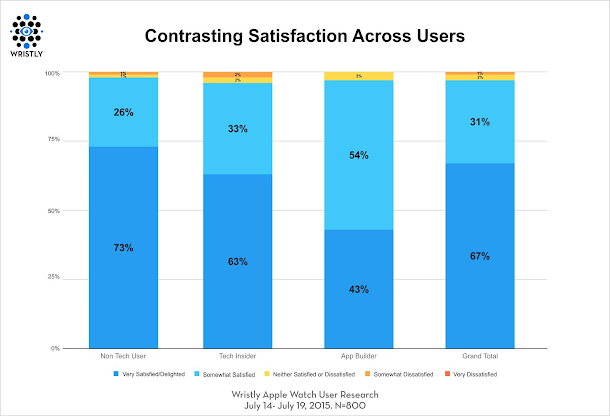As I listened to 14 different people tell me about their Apple Watch, I observed a pattern. Those whose job it was to think about the Apple Watch or who were early adopters who thought deeply about tech and the tech products they buy, were all much more critical of the watch. You could tell they evaluated it and thought about it deeply from every angle by their responses. Then I talked with teachers, firefighters, insurance agents, and those not in the tech industry and not hard-core techies. These groups of people couldn’t stop raving about the Apple Watch and how much they loved the product. It was almost as if the farther away people were from tech or the tech industry, the more they liked the Apple Watch.
Ben Bajarin
Interesting results, but they should be taken with a (big) grain of salt, because the survey is inherently skewed. First of all, the respondents were all Apple Watch owners, meaning the survey doesn’t capture dissatisfied buyers who already returned or resold the gadget. And some of the responses (not mentioned in the article, but available in the full study) contradict the conclusion of near-perfect customer satisfaction, for example: when asked about the perceived value of the Watch, 12% consider that the Watch was a poor value relative to cost – much higher than the 3% dissatisfaction rate; when asked if they were likely to purchase the device for someone else, a full 34% replied with a ‘No’, again not an indication of satisfaction. This could mean that either the control questions were incorrectly formulated, or people in the survey are not that happy with the Watch as implied. The survey also fails to mention which model people own – that should have been one of the top questions.

But let’s put these issues aside for a moment and assume the methodology was flawless and the results an accurate representation of Apple Watch customers. Does high customer satisfaction automatically translate into market success? Not necessarily: look no further than two Apple products to see that’s not the case. Both the iPhone and the iPad constantly report high customer satisfaction in surveys, over 90%; but the iPhone can’t stop growing, both in the saturated markets of the West and in emergent economies, while iPad sales have stagnated and even declined for multiple quarters. Satisfaction can mean many things, from ‘I enjoy this product so much that I’m buying it again for the foreseeable future’ to ‘it works so well that I don’t need to buy another one just yet’.
Post a Comment